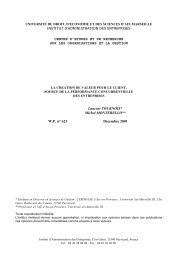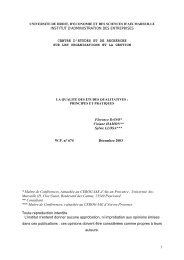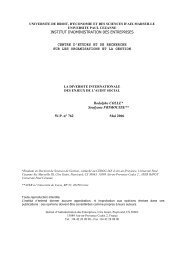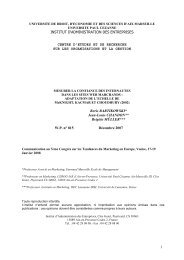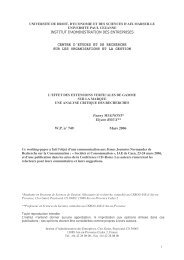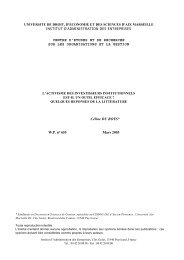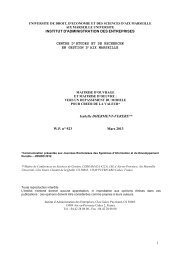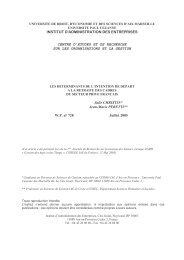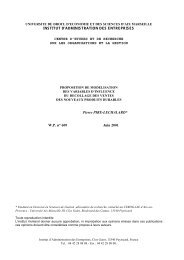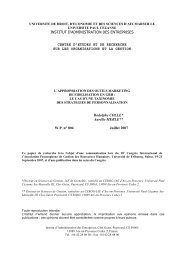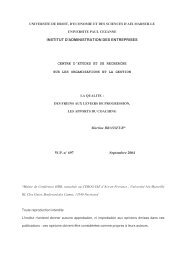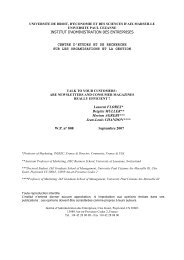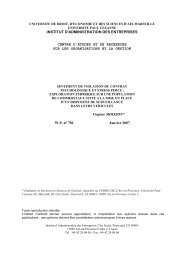Performance des LBO : Une revue de littérature - cergam
Performance des LBO : Une revue de littérature - cergam
Performance des LBO : Une revue de littérature - cergam
Create successful ePaper yourself
Turn your PDF publications into a flip-book with our unique Google optimized e-Paper software.
Résumé : Depuis quelques années, la France détient la <strong>de</strong>uxième place en Europe, après le Royaume-<br />
Uni en ce qui concerne les investissements dans les opérations <strong>de</strong> <strong>LBO</strong>. Ce constat s’explique par une<br />
meilleure performance <strong><strong>de</strong>s</strong> firmes reprises par <strong>LBO</strong>. Mais sur ce sujet les résultats <strong><strong>de</strong>s</strong> étu<strong><strong>de</strong>s</strong><br />
empiriques françaises ne concor<strong>de</strong>nt pas avec ceux <strong><strong>de</strong>s</strong> étu<strong><strong>de</strong>s</strong> anglo-saxonnes. Il va alors s’agir dans<br />
cet article dans un premier temps d’énoncer les différentes bases théoriques sur lesquelles s’appuie le<br />
principe du <strong>LBO</strong>. On différenciera les apports <strong>de</strong> la théorie <strong>de</strong> l’agence, <strong>de</strong> l’asymétrie d’informations,<br />
<strong>de</strong> la théorie <strong><strong>de</strong>s</strong> coûts <strong>de</strong> transaction, et <strong>de</strong> la théorie <strong><strong>de</strong>s</strong> free cash flows, puis leurs controverses au<br />
travers notamment <strong>de</strong> l’hypothèse du transfert <strong>de</strong> richesse, et <strong>de</strong> l’hypothèse <strong>de</strong> l’économie d’impôts.<br />
Il apparaîtra que la théorie <strong><strong>de</strong>s</strong> free cash flows (issue <strong>de</strong> la théorie <strong>de</strong> l’agence) permet bien, dans<br />
certains cas, d’expliquer le phénomène <strong>LBO</strong>, et que les gains <strong><strong>de</strong>s</strong> actionnaires ne sont pas dus à <strong><strong>de</strong>s</strong><br />
transferts <strong>de</strong> richesse au détriment <strong><strong>de</strong>s</strong> autres parties prenantes. On nuancera cependant l’apport <strong>de</strong> la<br />
théorie <strong><strong>de</strong>s</strong> FCF qui renferme certaines faiblesses et ouvre la voie vers <strong>de</strong> nouvelles recherches,<br />
notamment par une approche cognitive. Quant à l’hypothèse <strong>de</strong> l’économie d’impôts, elle ne permet<br />
pas à elle seule d’expliquer les meilleures performances post <strong>LBO</strong>. On énoncera ensuite plus<br />
précisément les performances observées (meilleure productivité, meilleur résultat d’exploitation etc.),<br />
en tentant d’expliquer les divergences entre les résultats français et les résultats anglo-saxons. On<br />
constatera enfin que celles-ci s’expliquent surtout par les différences au niveau <strong>de</strong> la nature <strong><strong>de</strong>s</strong> cibles,<br />
<strong>de</strong> l’effet <strong>de</strong> levier utilisé, et d’un environnement actuel différent en termes <strong>de</strong> gouvernement<br />
d’entreprise <strong>de</strong> celui <strong><strong>de</strong>s</strong> années fastes <strong><strong>de</strong>s</strong> <strong>LBO</strong>.<br />
Mots clés : Leverage Buy-Out, retraits <strong>de</strong> la cote, structure du capital, gouvernement d’entreprise, free<br />
cash flows.<br />
Abstract : This last 30 years <strong>LBO</strong> has provoked a great attraction and nowadays especially in Europe<br />
where France holds the second place behind England. This phenomenon can be explained by the<br />
better performance of <strong>LBO</strong> firms. But, results of Anglo-Saxon studies don’t agree with the French<br />
ones. Therefore the aim of this paper will be first to express the theoretical foundations such as agency<br />
theory, asymmetric information, costs of transaction, free cash flow (FCF) theory, and then their<br />
controversies via wealth transfer and tax savings hypothesises. This article will show that the FCF<br />
theory enables sometimes to explain <strong>LBO</strong> transactions, that sharehol<strong>de</strong>rs gains don’t come from<br />
wealth transfers at stakehol<strong>de</strong>rs’ expense. However, the FCF theory will also be contradicted and its<br />
weaknesses will open the door for a cognitive approach. As for the tax saving hypothesis, it cannot<br />
explain the better performances of targets after the <strong>LBO</strong>. Then these performances will be stated<br />
trying to explain the differences observed between French and Anglo-Saxon <strong>LBO</strong>. These differences<br />
are partly due to the different nature of the French targets, the financial leverage, and the changes in<br />
the corporate governance since the 80’s.<br />
Key words : Leverage Buy-Out, going private transactions, capital structure, corporate governance,<br />
free cash flows.<br />
3




